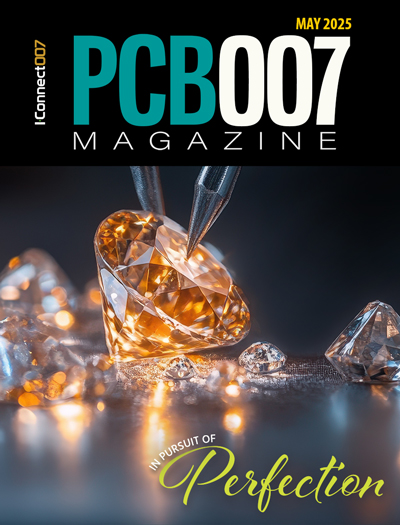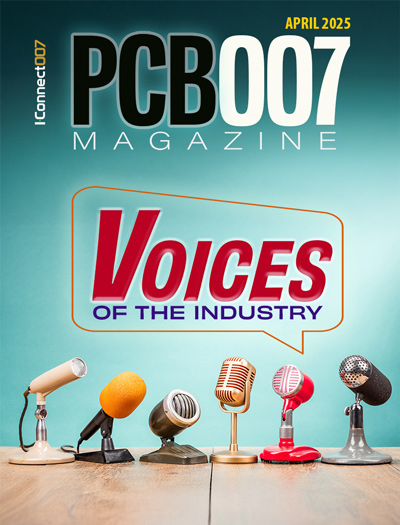-

- News
- Books
Featured Books
- pcb007 Magazine
Latest Issues
Current Issue
The Hole Truth: Via Integrity in an HDI World
From the drilled hole to registration across multiple sequential lamination cycles, to the quality of your copper plating, via reliability in an HDI world is becoming an ever-greater challenge. This month we look at “The Hole Truth,” from creating the “perfect” via to how you can assure via quality and reliability, the first time, every time.

In Pursuit of Perfection: Defect Reduction
For bare PCB board fabrication, defect reduction is a critical aspect of a company's bottom line profitability. In this issue, we examine how imaging, etching, and plating processes can provide information and insight into reducing defects and increasing yields.

Voices of the Industry
We take the pulse of the PCB industry by sharing insights from leading fabricators and suppliers in this month's issue. We've gathered their thoughts on the new U.S. administration, spending, the war in Ukraine, and their most pressing needs. It’s an eye-opening and enlightening look behind the curtain.
- Articles
- Columns
- Links
- Media kit
||| MENU - pcb007 Magazine
IPC: Lead Added to EU REACH Candidate List of SVHCs
July 13, 2018 | Nicolas Robin, IPC Senior Director, EuropeEstimated reading time: 3 minutes
The European Chemicals Agency (ECHA) added lead metal on its Candidate List of Substances of Very High Concern (SVHCs), on 27 June 2018, owing to its properties as a reprotoxic substance.
What does Candidate Listing mean for IPC Members?
Companies may have legal obligations resulting from the inclusion of lead metal in the Candidate List. Candidate Listing means that EU suppliers of articles containing more than 0.1% by weight of lead – including lead-based batteries, architectural lead sheet, engineered lead products and those manufactured with lead containing alloys – must provide information to the recipients which allows for safe use.
Note that in the case of complex objects (i.e. objects made up of more than one article joined or assembled together), the 0.1% threshold applies to each article. As a minimum, the information provided by the article supplier must contain the name of the substance, if present above the 0.1% threshold. The information must be provided in writing and free of charge.
There is also a requirement to notify ECHA. This notification must be submitted by the importer/producer no later than six months after the substance was included in the Candidate List. EU and EEA suppliers of substances on the Candidate List must provide their customers with a safety data sheet (SDS), including relevant exposure scenarios where relevant. Lead producers should already be doing so, but an update is recommended to notify their customers of the inclusion of lead metal in the Candidate list as a Substance of Very High Concern.
The obligation to provide a SDS also applies to mixtures including solders and (pre-fabricated) alloys; however, if the mixture does not meet the criteria for classification as hazardous under CLP, the SDS needs only to be provided at the recipient’s request.
What are the next steps?
The next regulatory step after Candidate Listing is the inclusion of the substances on the so-called Authorization List. Once included on the Authorization List, companies wishing to use the substance will have to apply for application-specific permissions from ECHA.
a) 2019: With lead metal included on the Candidate List in June 2018, it could be included in ECHA’s prioritization exercise in 2019, with a formal recommendation likely to be submitted by ECHA to the European Commission the same year.
b) 2021: If the REACH Committee of Member State representatives agrees to include lead metal in Annex XIV, the Authorization List, the substance could be added as early as 2021; a transitional period would apply, potentially giving rise to a ‘sunset date’ (after which REACH Authorization would be required to use lead metal, unless exemption applied) in 2024.
c) Before 2024: Companies applying for authorization to use lead metal in the EU would need to submit their application at least 18 months before the sunset date to prevent supply chain disruption. Authorization would only be granted if the risks to human health or the environment from the use of metallic lead on its own or in a mixture above the relevant concentration threshold is proven to be adequately controlled or, in the case where adequate control cannot be demonstrated that the financial benefits of continued use outweigh the societal costs of the health and/or environmental impacts and that there are no suitable alternative substances or technologies for the use.
What can IPC and its members do?
IPC will be engaged in an advocacy campaign in partnership with an Eurometaux/ILA cross commodity platform. The goal of this campaign will be to stop the inclusion of lead in the authorization list, or if not possible to advocate for exemptions.
Engage with lead cross commodity platform (September 2018-2019)
1. Map out the use of lead across the industry and assess where the risks areas and potential adverse effects are and in which applications substitutions to lead are possible.
2. If lead metal were to be prioritized for Authorization, a 90-days public consultation will be opened to gather views on transition periods, case studies and examples highlighting where REACH Authorization would lead to regulatory overlap or inconsistency. Data will need to be collected from IPC membership to develop a socio-economic analysis.
Focus efforts on R&D funding for substitution: Both ECHA and the European Commission are very keen on fostering R&D efforts on substitution, for which the EU offers a specific budget line. IPC will assess the possibility to get funding opportunities for research on leadfree electronics and has already initiated preliminary contacts with the European Commission service in charge of R&D.
If you have any questions or comments please contact NicolasRobin@IPC.org.
Suggested Items
Advancing Aerospace Excellence: Emerald’s Medford Team Earns Space Addendum Certification
06/30/2025 | Emerald TechnologiesWe’re thrilled to announce a major achievement from our Medford, Oregon facility. Andy Abrigo has officially earned her credentials as a Certified IPC Trainer (CIT) under the IPC J-STD-001 Space Addendum, the leading industry standard for space and military-grade electronics manufacturing.
Magnalytix and Foresite to Host Technical Webinar on SIR Testing and Functional Reliability
06/26/2025 | MAGNALYTIXMagnalytix, in collaboration with Foresite Inc., is pleased to announce an upcoming one-hour Webinar Workshop titled “Comparing SIR IPC B-52 to Umpire 41 Functional & SIR Test Method.” This session will be held on July 24, 2025, and is open to professionals in electronics manufacturing, reliability engineering, and process development seeking insights into new testing standards for climatic reliability.
IPC Rebrands as Global Electronics Association: Interview With Dr. John W. Mitchell
06/22/2025 | Marcy LaRont, I-Connect007Today, following a major announcement, IPC is embracing the rapid advancement of technology with a bold decision to change its name to the Global Electronics Association. This name more accurately reflects the full breadth of its work and the modern realities of electronics manufacturing. In this exclusive interview, Global Electronics Association President and CEO Dr. John W. Mitchell shares the story behind the rebrand: Why now, what it means for the industry, and how it aligns with the organization’s mission.
Global Electronics Association Debuts; New Name Elevates IPC’s 70-Year Legacy as Voice of $6 Trillion Electronics Industry
06/25/2025 | Global Electronics AssociationToday begins a new chapter for IPC as it officially becomes the Global Electronics Association, reflecting its role as the voice of the electronics industry. Guided by the vision of “Better electronics for a better world,” the Global Electronics Association (electronics.org) is dedicated to enhancing supply chain resilience and promoting accelerated growth through engagement with more than 3,000 member companies, thousands of partners, and dozens of governments across the globe.
I-Connect007 Editor’s Choice: Five Must-Reads for the Week
06/20/2025 | Andy Shaughnessy, I-Connect007It’s been a busy week in this industry, and we have news and articles from the PCB design, fabrication and assembly communities. Some of this news is out of this world. We may be losing the high ground—the really high ground. Columnist Jesse Vaughan explains how the U.S. seems to be falling behind in space, and how this could affect our ability to defend ourselves in the future. We have an update on the U.S.-China tariff talks, which seem to be moving forward, though sometimes at a snail’s pace.


